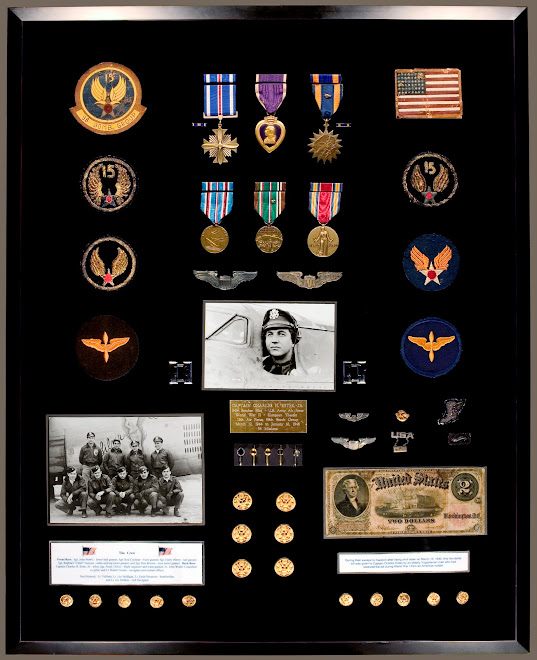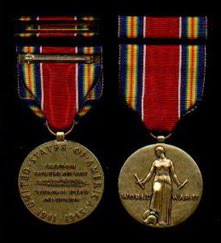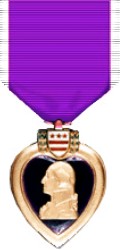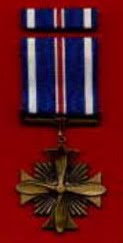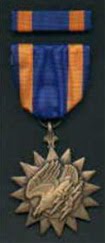(Continuation of Captain Charles Estes's War Memoirs)
"There were some several funny things that happened about
the tent. We went to a place where they had some soft
rock and the Italians had sawed these rocks into blocks,
and so for a couple of cartons of cigarettes we got enough
blocks to put around the edge of our tent and enclosed us.
It then being out in a middle of a field, we had a lot of
mice running around. And someone showed us, the
Italian -- or the 98th Bomb Group Mouse Trap, which
consisted of a pail with water in it and a knife from
the mess hall.
Now the way the trap works is you put the handle on
a table towards the inside of the table, and the blade
out over the pail of water, and then on the tip of the
blade you put a piece of cheese. Well, the little mouse
could smell or see the cheese and he would start out
on the knife blade and would finally throw the blade
out of balance, and the blade and the mouse would
fall into the water.
Well, of course, the only trouble with the trap was
that now you had a squeaking mouse on your hands
in the middle of the night, and he'd wake you up
and you start feeling sorry for him, but you knew
if you were going to let the trap do its job you just
have to let 'em go on and drown himself, and so
you did and soon he stopped squeaking and you
knew everything was all right. But that was
something that we never found out who thought
up the trap, but we know that it was something
that was handed down from one crew to another;
and I imagine that the mess hall didn't have any
knives or they had to order a new supply because
all of the crews in every tent had one of these
little traps in it I'm sure.
Well, that was a lot of fun and it was unusual.
You don't hear of things like that. It would work
in this country if you had enough mice; we just
don't have enough mice to go the trouble of fixing
it up like that."
(To be Continued.)
Saturday, July 24, 2010
Sunday, July 18, 2010
Our Crew and I have arrived in Gioia, Italy
(Continuation of Captain Charles Estes's War Memoirs)
"We have landed there and turned the airplane over to the Air
Force there and they assigned us to tents to spend the night.
And it was rather chilly. I want to say it must have been
October. I'd have to look at my short snorter to find out.
By the way, the short snorter was the best book or best
reference for times, places and dates, and things of that
nature that you could have.
Anyway, we took off for Gioia, Italy and landed there
and turned the airplane over to them, and they in turn
gave us tents to sleep in. And I remember we just had cots
and the cots, of course, are very thin on the bottom. So
we tried sleeping with the blankets over us, but you still
were freezing to the death almost, because there was nothing
under you; so we each one got up and let the other -- let
somebody on the crew to hold a blanket up, and you turned
around and around and around, and they wrapped you up in
it, and then you stumbled over to the cot and things were a
lot better.
The next day we were assigned to a squadron, it was not too
far from Gioia; it was in Lecce, which is in the heel of the
boot. And we were assigned to the 415th Bomb Squadron.
It was -- the CO was Joe -- Colonel Joe Habenger (phonetic).
And we were very lucky in being assigned to Gioia because
there was the Italian Air Base there that had a concrete
runway. The men that went further up from us, other
squadrons they had to land on steel macadem runways.
And they were not real comfortable to land on, they were
rough; but we were lucky we had concrete runways to
land on. And we had an officer's club that was in a brick
building and it was real nice. John Congleton, Bob Swain,
and myself were assigned to a tent, and we stayed together the
whole time we were in Italy in that same tent, and we managed."
(To be Continued.)
"We have landed there and turned the airplane over to the Air
Force there and they assigned us to tents to spend the night.
And it was rather chilly. I want to say it must have been
October. I'd have to look at my short snorter to find out.
By the way, the short snorter was the best book or best
reference for times, places and dates, and things of that
nature that you could have.
Anyway, we took off for Gioia, Italy and landed there
and turned the airplane over to them, and they in turn
gave us tents to sleep in. And I remember we just had cots
and the cots, of course, are very thin on the bottom. So
we tried sleeping with the blankets over us, but you still
were freezing to the death almost, because there was nothing
under you; so we each one got up and let the other -- let
somebody on the crew to hold a blanket up, and you turned
around and around and around, and they wrapped you up in
it, and then you stumbled over to the cot and things were a
lot better.
The next day we were assigned to a squadron, it was not too
far from Gioia; it was in Lecce, which is in the heel of the
boot. And we were assigned to the 415th Bomb Squadron.
It was -- the CO was Joe -- Colonel Joe Habenger (phonetic).
And we were very lucky in being assigned to Gioia because
there was the Italian Air Base there that had a concrete
runway. The men that went further up from us, other
squadrons they had to land on steel macadem runways.
And they were not real comfortable to land on, they were
rough; but we were lucky we had concrete runways to
land on. And we had an officer's club that was in a brick
building and it was real nice. John Congleton, Bob Swain,
and myself were assigned to a tent, and we stayed together the
whole time we were in Italy in that same tent, and we managed."
(To be Continued.)
Sunday, July 11, 2010
We have landed in Tunisia
(Continuation of Captain Charles Estes's War Memoirs)
"Anyway, the next day we were briefed on our little trip
to Tunisia. Now when we took off we were flying over
the north tip of the north part of Africa, and we went
over these deserts that the 98th Bomb Group had flown
its missions, the low level missions or high level missions
to Ploesti; it was a very historic flight for me.
We landed in Tunisia and they had a bay out from Tunisia,
and it was full of ships that had been sunk. I mean, it
just looked like cardboard: all kinds of boats, all sizes and
everything else. The German's had sunk 'em, they were
probably American ships. Well anyway, we saw our
first camels there and there was a sergeant that had a
jeep, and he asked some of us if we wanted to ride around
and look at Tunisia; and that was a great opportunity
for us except that we didn't, any of us, have a camera.
He carried us by one house and he said there was a
sheik that lives in that house and he married an
American girl. She was with the Red Cross, a nurse
with the Red Cross. Well, I couldn't imagine an
American girl wanting to marry an Arabic sheik, but
I'm sure it must have had some advantage to it or she
wouldn't have married him.
Well, we -- after our little trip of sightseeing and seeing
camels and everything else, we were taken to a place
where we would spend the night, and the next morning
we were briefed on a trip that would take us to
Gioia, Italy; that's where we were to leave our plane,
so we knew we were very close to the end of our trip.
And the next day we got on the plane and took off and
ol' Swain told us how to get there, and we made our
way to Gioia, Italy."
(To be Continued)
"Anyway, the next day we were briefed on our little trip
to Tunisia. Now when we took off we were flying over
the north tip of the north part of Africa, and we went
over these deserts that the 98th Bomb Group had flown
its missions, the low level missions or high level missions
to Ploesti; it was a very historic flight for me.
We landed in Tunisia and they had a bay out from Tunisia,
and it was full of ships that had been sunk. I mean, it
just looked like cardboard: all kinds of boats, all sizes and
everything else. The German's had sunk 'em, they were
probably American ships. Well anyway, we saw our
first camels there and there was a sergeant that had a
jeep, and he asked some of us if we wanted to ride around
and look at Tunisia; and that was a great opportunity
for us except that we didn't, any of us, have a camera.
He carried us by one house and he said there was a
sheik that lives in that house and he married an
American girl. She was with the Red Cross, a nurse
with the Red Cross. Well, I couldn't imagine an
American girl wanting to marry an Arabic sheik, but
I'm sure it must have had some advantage to it or she
wouldn't have married him.
Well, we -- after our little trip of sightseeing and seeing
camels and everything else, we were taken to a place
where we would spend the night, and the next morning
we were briefed on a trip that would take us to
Gioia, Italy; that's where we were to leave our plane,
so we knew we were very close to the end of our trip.
And the next day we got on the plane and took off and
ol' Swain told us how to get there, and we made our
way to Gioia, Italy."
(To be Continued)
Saturday, July 3, 2010
French Morocco
(Continuation of Captain Charles Estes's War Memoirs)
"Well, on our way back we were walking along this road
and we got behind an old Portuguese I would think, and
he was driving a little cart and it was pulled by a mule
or a donkey, and he pulled up to this rock fence and stopped
and jumped down off of the cart; went over to the fence and
started taking rocks out of the fence and laying 'em on the
ground until he had made an opening big enough for the
cart to go through. When he had done this, he jumped
back on the cart, went back through the hole in the fence
and jumped off the cart and came back and put the fence
back up again rock by rock.
I think we all decided that that was the first gate that
we had ever seen without any hinges. Well, we didn't
have anything to say to this old man because he couldn't
speak English, and we couldn't speak Portuguese so we
walked on back to the base, and they gave us our quarters
and we stayed around for a little while, ate supper and
went to bed and they briefed us the next morning on our
trip to French Morocco. After we'd gotten all our instructions
we all got in the airplane and took off for Africa.
Well, this was a shorter run, I don't think it was but
six or seven hours, and then we had landed in Morocco.
We turned the plane over to the crew chief and he saw
that it got filled up with gasoline and checked everything
out to be sure that everything was all right, and we were
assigned our quarters.
We were assigned our quarters at French Morocco, and
I met this young Moroccan who was more or less what you
would call a cabin boy. He was to make up the beds and see
that everything was clean and kept in good shape for the
crews that would come after us.
Like all Moroccans he had something in his pocket to
sell, so he pulled out this wallet; it was made out of Moroccan
leather, and he presented it to me and said he wanted so
much for it. I've forgotten now, it wasn't much, but in any
case, I bought it and I said that would be a good thing for
me to keep my short snorter in it. I also got a bill from him,
a bill of money, so that I could put it with my short snorter,
and he signed it and signed my leather wallet."
(To be Continued)
"Well, on our way back we were walking along this road
and we got behind an old Portuguese I would think, and
he was driving a little cart and it was pulled by a mule
or a donkey, and he pulled up to this rock fence and stopped
and jumped down off of the cart; went over to the fence and
started taking rocks out of the fence and laying 'em on the
ground until he had made an opening big enough for the
cart to go through. When he had done this, he jumped
back on the cart, went back through the hole in the fence
and jumped off the cart and came back and put the fence
back up again rock by rock.
I think we all decided that that was the first gate that
we had ever seen without any hinges. Well, we didn't
have anything to say to this old man because he couldn't
speak English, and we couldn't speak Portuguese so we
walked on back to the base, and they gave us our quarters
and we stayed around for a little while, ate supper and
went to bed and they briefed us the next morning on our
trip to French Morocco. After we'd gotten all our instructions
we all got in the airplane and took off for Africa.
Well, this was a shorter run, I don't think it was but
six or seven hours, and then we had landed in Morocco.
We turned the plane over to the crew chief and he saw
that it got filled up with gasoline and checked everything
out to be sure that everything was all right, and we were
assigned our quarters.
We were assigned our quarters at French Morocco, and
I met this young Moroccan who was more or less what you
would call a cabin boy. He was to make up the beds and see
that everything was clean and kept in good shape for the
crews that would come after us.
Like all Moroccans he had something in his pocket to
sell, so he pulled out this wallet; it was made out of Moroccan
leather, and he presented it to me and said he wanted so
much for it. I've forgotten now, it wasn't much, but in any
case, I bought it and I said that would be a good thing for
me to keep my short snorter in it. I also got a bill from him,
a bill of money, so that I could put it with my short snorter,
and he signed it and signed my leather wallet."
(To be Continued)
Subscribe to:
Comments (Atom)







.jpg)
